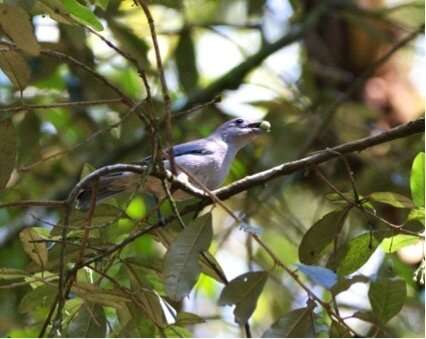Birds that disperse more types of seed have better evolutionary chances

More than 70% of plant species that produce flowers depend on birds to disperse their seeds. Birds feed on fruit from a wide array of different plants, and bird-plant interactions configure a welter of complex networks.
A study conducted at the University of São Paulo’s Institute of Biosciences (IB-USP) in Brazil shows that the evolutionary stability of each bird species depends on the position it occupies in these networks, increasing in step with the number and centrality of its interactions with potential partner plant species and the number of network connections it maintains.
The study was funded by São Paulo Research Foundation—FAPESP and is reported in the journal Science.
“The bird species that occupy more central positions in a network, that have more connections, tend to be more stable in macroevolutionary terms,” Gustavo Burin, first author of the article, told Agência FAPESP.
According to Burin, establishing this correlation between species interactions and their evolutionary dynamics was a huge challenge because it required an analysis of two processes—seed dispersal and evolution—that occur on entirely different time scales. Seed dispersal takes place annually, while evolution unfolds over millions of years.
“We worked on this for four years, integrating data on 468 bird species belonging to 29 seed dispersal networks,” he said. “We demonstrated that the more links a bird species establishes with plant species, the greater its evolutionary chances.
“More precisely, the greater the evolutionary stability of a bird species, the more chances we have of observing its relative importance in a seed dispersal network, measured by the number and pattern of interactions established by the bird species.
“Species that occupy central positions in a network have two important traits: either they live longer or they belong to groups that accumulate many species in a relatively short time, so that if a species disappears it’s replaced by many other similar ones.”
Among birds native to Brazil, the examples of longevous species include the Rufous-bellied thrush (Turdus rufiventris) and the Sayaca tanager (Thraupis sayaca).
“Here we’re emphasizing the importance of interaction with plants to the evolutionary success of bird species, but the reverse may also be true in the sense that plants that can rely on more bird species to disperse their seeds are more likely to propagate and survive. When a dispersing vertebrate exists, the seeds can be carried dozens of miles away from the plant,” Burin said.
This mechanism is more intense and effective in warm wet regions less subject to seasonal variations. It is no accident that the world’s prime animal and plant biodiversity hotspots are in Colombia’s Amazon region and Southeast Asia.
The study combined ecological data, mathematical and computational modeling, and analytical tools derived from complex network analytics. The other co-authors are Paulo Guimarães Jr. and Tiago Quental.
Bird species central to seed-dispersal networks have stable evolutionary lineages
Gustavo Burin et al, Macroevolutionary stability predicts interaction patterns of species in seed dispersal networks, Science (2021). DOI: 10.1126/science.abf0556
Citation:
Birds that disperse more types of seed have better evolutionary chances (2021, August 11)
retrieved 11 August 2021
from https://phys.org/news/2021-08-birds-disperse-seed-evolutionary-chances.html
This document is subject to copyright. Apart from any fair dealing for the purpose of private study or research, no
part may be reproduced without the written permission. The content is provided for information purposes only.
For all the latest Science News Click Here
For the latest news and updates, follow us on Google News.

